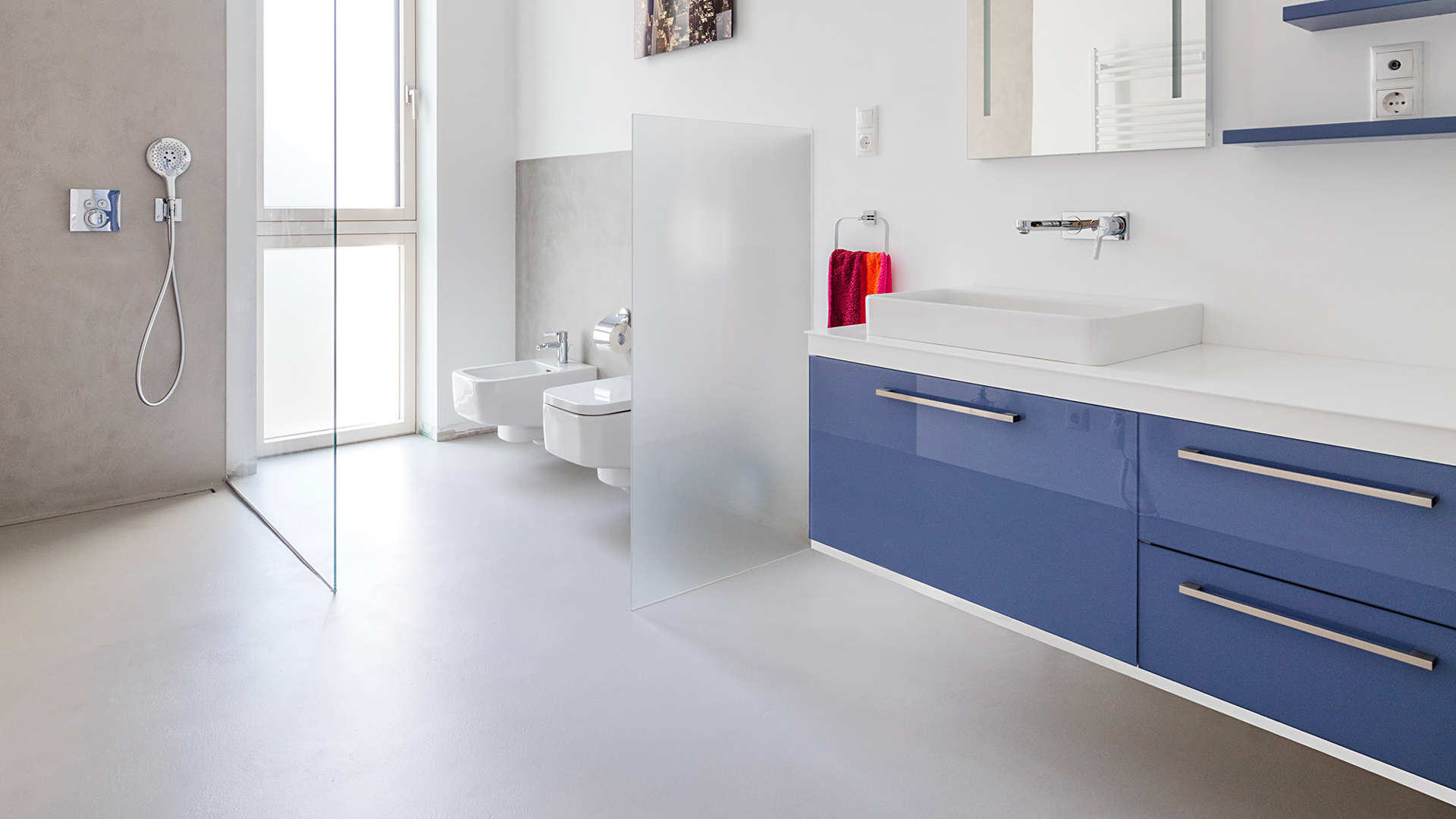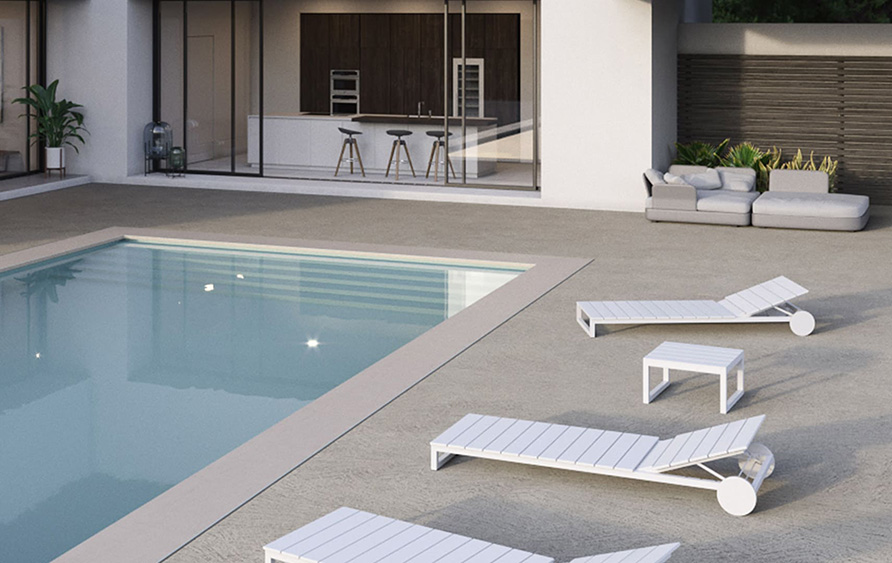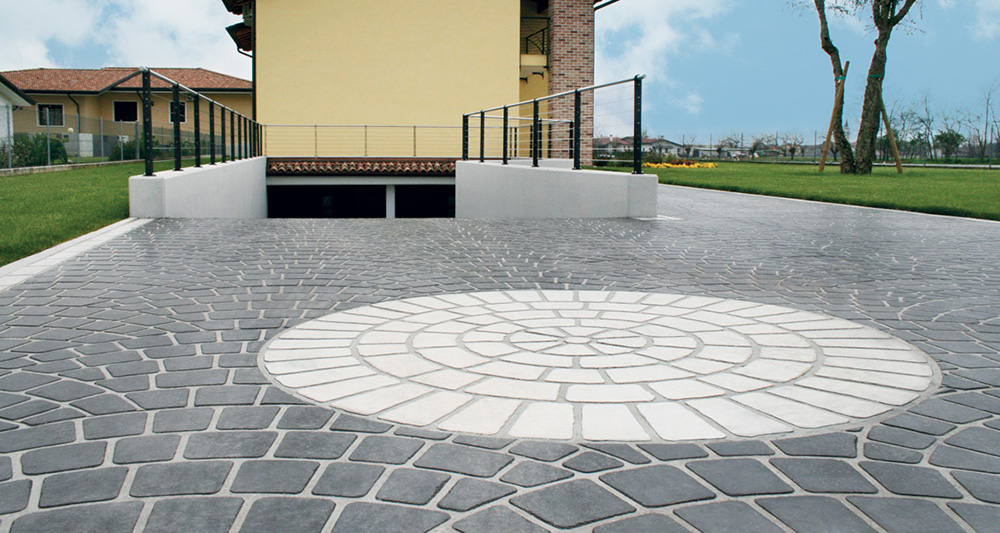The expression “feet planted firmly on the ground” is perfect in this case.
When walking on potentially wet surfaces, such as those in bathrooms, on pool decks or ramps, it is important to feel safe and avoid dangerous accidents.
Legally, these areas are required to be covered with slip-resistant surfaces to prevent falls and unpleasant accidents. We will now look at the features of slip-resistant materials, the regulations with which they have to comply and the certifications they need in order to be formally attested as safe.
Ideal Work creates high quality, extremely durable, slip-resistant surfaces that comply with safety regulations in all kinds of environment: residences, offices, retail stores, hospitality, public buildings etc.
What does slip-resistant mean?
A slip-resistant surface is one designed and made from specific materials that enhance its adherence and friction in order to avoid accidents caused by slipping. The application of a slip-resistant floor is a practical choice for certain internal and external environments, but in some cases – due to legal requirements and regulations – it is mandatory.
In areas such as bathrooms, ramps and pool decks, the surface is required to be slip and shock-resistant.
Through its experienced team, Ideal Work offers several slip-resistant solutions suitable for the most diverse aesthetic styles and practical needs, all in compliance with – and therefore certified by – national and European regulations.
What are these regulations and certifications?
Regulations and certifications for slip-resistant surfaces.
When it comes to slip-resistant surfaces, technical features and application procedures are regulated by both national and international certifications. This is to ensure the safety of those who use them; with higher adherence and friction between shoes or bare feet and the surface, the danger of unpleasant accidents like slipping and falling is eliminated.
Ideal Work features several types of surfaces that comply with the necessary regulations and are therefore attested by the following certifications:
Din 51130 Certification
German Din 51130 Certification sets the parameters for shoe and barefoot passage on slip-resistant surfaces.
A specific test is run to prove that the surface and its finish are perfectly applied. A sample of the surface is placed on a plane with variable inclination, which is then coated with motor oil; a person wearing a pair of safety shoes walks upwards and downward upon it. By varying the plane’s inclination, it is possible to test at which angle the person can no longer stay balanced and, according to the result, the surface is assigned a determinate level of slip risk (R). The higher the angle, the higher the level of slip risk, which necessarily corresponds to a consequent level of required adherence.
Classifications for slip-resistant surfaces include the following:
- R9: from 3 to 10 degrees of inclination: surfaces with normal adherence
- R10: from 10 to 19 degrees of inclination: surfaces with medium adherence
-
R11: from 19 to 27 degrees of inclination: surfaces with strong adherence
- R12: from 27 to 35 degrees of inclination: surfaces with very strong adherence
Ideal Work develops and creates surfaces for internal and external use based on project specific needs, offering smooth (R9) as well as safe, slip-resistant solutions with strong adherence (R12).
Din 51097 Certification
Similar to Din 51130, German Din 51097 Certification sets the parameters for barefoot passage on slip-resistant and shock-resistant surfaces. This certification also requires a specific test, similar to that of Din 51130, but with two differences: the person is barefoot and the surface is treated with water and/or a liquid soap solution instead of motor oil.
Din 51097 Certification establishes a different classification based on the surface’s adherence level:
- A: from 12 to 18 degrees of inclination: surfaces with medium adherence
-
B: from 18 to 24 degrees of inclination: surfaces with strong adherence
-
C: over 24 degrees of inclination: surfaces with very strong adherence
UNI EN 14231:2004 Regulation
Ideal Work committed to fully comply with another regulation to create its perfect slip-resistant surfaces: UNI EN 14231:2004.
This regulation defines the level of slip-resistance of natural stone paving in many environments(domestic, office, public buildings, retail stores, hospitality, museums etc). The slip-resistance and friction of natural stone surfaces are established by a tilting test which uses specific equipment to determine the degree of slipperiness of the surface when dry and wet.
Ideal Work professionals develop and create ad hoc surfaces with particular attention to the classification of materials. Through quick application, Ideal Work provides beautiful, safe and durable solutions with a wide range of finish and colour custom possibilities.
Ideal Work slip-resistant surfaces: practical advice
There are several factors to consider when choosing a slip-resistant surface for an internal or external space. But how can you choose the best option for your needs? Are there different kinds of finish particularly suitable for specific spaces?
The short answer is yes. Ideal Work offers high-quality solutions specifically developed to meet all your practical and aesthetic needs.
– Microtopping® provides a slip-resistant surface with a thickness of just 2-3 mm. It is particularly suitable for internal surfaces, like those in bathrooms, to prevent falls and unpleasant accidents. There are endless combinations of colours and textures on a scale from delicate, neutral shades to more vibrant, bold colours.

– Particularly suitable for external areas such as pool decks, Rasico® and Sassoitalia perfectly complement any kind of environment through their wide range of textures and colours. You can choose the level of roughness and friction you prefer by opting for small, sophisticated aggregates or more rustic and tactile effects.

– For a ramp used for the passage of people and vehicles, Ideal Work Stenciltop® and Stamped Concreteare the best systems for you. Extremely resistant to adverse weather conditions, chemical agents and foot-traffic, they are applied quickly yet require minimal maintenance to keep their slip-resistance and beauty unaltered over time.

The main advantage of Ideal Work solutions is the possibility to apply them directly over existing surfaces with no need for their removal. Through such cost-effective and time-saving processes you can obtain a refined, innovative result.
Consult Ideal Work experts to get advice on the best slip-resistant solution for your internal or external spaces!